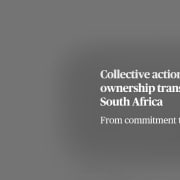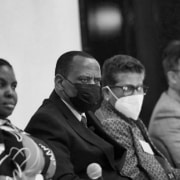|
Getting your Trinity Audio player ready...
|
Corruption Watch, together with the Department of Public Service and Administration (DPSA), the Financial Intelligence Centre, the Open Government Partnership, and Open Ownership, co-hosted a conference on taking steps towards achieving beneficial ownership transparency. Titled Collective action for beneficial ownership transparency (BOT) in South Africa: From commitment to implementation, the two-day event, on 16 and 17 May, brought together civil society organisations, government representatives, and the private sector to share progress to date, collectively discuss and determine how international best practice can be applied to South Africa, and define the collaborative role of each sector in putting South Africa’s various BOT commitments into action.
Introducing the first day’s proceedings, Dr Salomon Hoogenraad-Vermaak, head of the Public Administration Ethics, Integrity and Disciplinary Technical Assistance Unit in the DPSA, said: “This multi-stakeholder conference takes place at a time where concerns about the high levels of corruption in South Africa are real, and successful investigations and prosecutions of corruption cases depend heavily on access to timely, accurate and verified beneficial ownership information.”
Global attention is currently focused on the ownership and control of illicit assets, he added. The use of legal structures to conceal this valuable information includes the use of legal persons and arrangements to distance the beneficial owner from an asset, through complex chains of ownership.
The beneficial owner is not necessarily the same as the legal owner whose name appears on the company documents. The beneficial owner is the person who ultimately benefits from the activities of a company – for example, a service provider to government might be headed on paper by an independent person, but the real – beneficial – owner of the company is a public servant. The latter is not allowed to do business with the state, but has concealed their involvement with the private company through a middleman who acts on their behalf, for their personal gain.
When beneficial ownership is obscured, therefore, the risk of corruption increases.
BOT will deter much more than just irregular business relationships at the local, provincial and national level. International criminal syndicates use beneficial ownership opacity to move their dirty money around the world under cover of seemingly legitimate business activities. Beneficial ownership opacity is thus a key enabler of corruption and money laundering.
Vermaak said: “Moving forward as a country, one of the means South Africa can apply to address the scourge of corruption is financial ownership transparency.”
Fighting corruption remains a priority of government, he emphasised, with President Cyril Ramaphosa reiterating in the 2022 State of the Nation Address that government is taking decisive steps to expose and banish good route activities.
“It is clear to me that as government, civil society and as South Africans we are indeed unified in our commitment to increase beneficial ownership transparency. We’re looking at the presence of senior officials from both government and civil society at this event, but it’s also reflected in the theme for the multi-stakeholder conference – Collective Action for beneficial ownership, transparency in South Africa, from commitment to implementation.”
Timely access to BO information is crucial
Keynote speaker Lieutenant-General Godfrey Lebeya, the head of the Directorate for Priority Crime Investigation and also the multi-sectoral Anti-corruption Task Team, focused his address on the importance of timely access to adequate, verified beneficial ownership information from a law enforcement perspective. He outlined both the challenges and the benefits to the collection, verification, disclosure, and exchange of beneficial ownership information.
“The identification of the true beneficiary owners or individuals poses a challenge to prosecutors, law enforcement agencies and intelligence practitioners across the globe. Schemes designed to obscure beneficial ownership continue to be enhanced to appear legitimate – this impairs the ability of financial institutions, professional intermediaries and competent authorities to identify suspicious activities.”
At the same time, criminals disguise their activities as legitimate corporate trade or hide illicit funds in the enormous volume of transactions that crosses the globe every day.
“Globalisation of trade and communication has increased the threat,” Lebeya said. “And countries now face the challenge of enforcing national laws in a borderless commercial environment.”
Veneer of respectability hides illicit activity
Complex ownership structures can provide a veneer of respectability, he said. Potential problematic interests and influences are hidden behind the seemingly reputable operating history of a shell company.
This is a particular concern, he added, when politically exposed persons hold hidden stakes in a company.
“From the public sector perspective, access to information on beneficial ownership is essential in order to remove the veil of secrecy and to prevent bad actors from maintaining plausible deniability and continuing to operate with impunity.”
Such information can assist law enforcement, tax authorities, and other authorities to follow the money in financial investigations involving suspect accounts or assets held by a corporate vehicle. It can also assist in locating a given person’s assets within a jurisdiction – important because assets are often moved around the world in an effort to hide them.
It’s the very complexity of some corporate structures that necessitates a multi-stakeholder approach, just as the fight against corruption requires co-operation across sectors.
“That identification of adequate, accurate, current and reliable information on beneficial ownership is the golden thread that runs through every initiative and regulatory regime that seeks to enhance transparency, reduce illicit financial flows, reverse harmful capital flight, and prevent criminals from laundering the proceeds of their criminal activities.”








